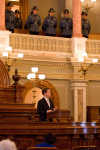Brownback to focus on declining rural population

Gov.-elect Sam Brownback recently told The Tribune he will use the influence he gained as a U.S. senator and presidential candidate to help boost Kansas' economy and population.
Brownback said he will propose the creation of Rural Opportunity Zones to give tax breaks to people who move to counties that have seen double-digit population declines the past decade. "Unfortunately, there are about 40 counties that qualify for it," he said in a telephone interview.
Other features of the Rural Opportunity Zones would be a 50-50 state and local match to buy down student loans and a five-year cancellation of state income taxes for five years for individuals moving into those counties from out of state.

However, with only a 3.3-percent population decrease from 2000-2009, or a loss of 505 citizens from 15,389 down to 14,884, Bourbon County would apparently not be eligible for the initiative to attract retirees and young professionals, county and federal sources said. Brownback Spokeswoman Sherriene Jones-Sontag said the assumption is there are existing programs that will help counties that haven't seen those losses. "There are literally counties that have been losing population for a really long time. That's why he's proposing rural opportunity zones," Jones-Sontag said.
Overall in Kansas' 105 counties, the state increased by 6.1 percent from 2.68 to 2.8 million, Brownback said. "We've lost huge population in these declining areas and we want people to bring their skills and desires," he said.
"Maybe it's retirees moving back from Chicago or California and coming home."
Brownback noted the Rural Opportunity Zones program would be available to counties that want to participate. They wouldn't have to.
"Some may decide they don't want to do this," he said. "That's up to them."
The program would also include other tax incentive proposals with the Office of the Repealer looking at ways of making the state a more business-friendly environment. "He also wants to look at the overall tax structure and look at how it operates now and how it can be improved upon so it doesn't hinder growth," Jones-Sontag said. "Some argue the way our taxes are structured hinders growth. ... You have to take a look at the big picture in regard to the tax structure and help the entire state grow."
Asked how much the rural opportunity zones would cost the state, Brownback said he would be presenting that figure -- along with the state's proposed budget -- to the legislature on Thursday. The reason for the zones is to prompt growth.
"If we get growth happening, the receipts start coming in. It might not be income taxes, but property (taxes), sales tax, economic activity. We've got to get the economy growing. If we do, our state receipts will start going up instead of down," Brownback said.
Although the state is facing at least a $500 million shortfall, Brownback said he wants to keep education funding stable and will not impose any new taxes.
"That one's off the table. You don't raise taxes in a down economic time. We will be looking to support the core functions of government -- education, public health, public safety -- and reducing, downsizing, or in some cases, eliminating non-core functions of the state government," he said.
Asked if he expected things to go smoothly because he will have a majority Republican legislature, Brownback wasn't so sure. "It's going to be difficult just because the budget is so tight. We've got a $500 million hole and a critical need to grow the economy and core obligations. ... ," he said. Whether they're Republican or Democrat, legislators may not want to go with the governor's ideas. "We will work with anyone who has better ideas."
Born and raised in Linn County and a graduate of both Kansas State University and the University of Kansas, Brownback worked as a radio broadcaster, attorney and teacher before becoming Kansas Secretary of Agriculture.
He then served as a member of the U.S. House of Representatives and was a member of the U.S. Senate from 1996-January 2011. Brownback, 54, announced last year he will honor his term limit pledge and not seek re-election to the U.S. Senate in 2010.
A 2008 presidential hopeful, Brownback has national and international name recognition -- something that will help when advocating for the Sunflower State. "I think it's going to help in a couple of ways. I have a contact base (nationally) and internationally that I'm going to be reaching out to and asking for their support, help and investment in Kansas," he said. "As well, I'm going to use it to use to look for national and global trends Kansas can play into to grow the state. ... I've already reached out to people to come work with us and come help us out in Kansas."
He and his wife, Mary, have five children.
